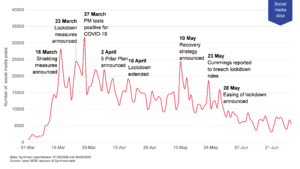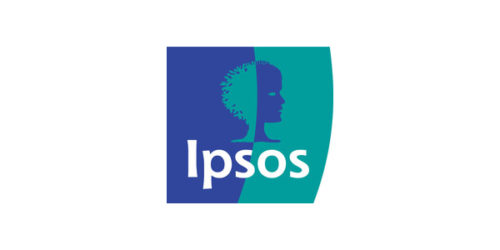
latest
New study reveals trends in online conversations about COVID-19

(9 September 2020) The COVID-19-related topics discussed in the highest volumes on social media during the recent national lockdown in the UK were those affecting the majority of the general public, including lockdown guidelines, testing, vaccines and the Government’s recovery strategy. Meanwhile, the online public paid less attention to announcements affecting specific groups, such as social care and guidance on shielding and, overall, online conversations about COVID-19 seem to be diminishing over time.
These are some of the insights from research undertaken by Ipsos MORI on behalf of the independent charity and think tank, Future Care Capital (FCC), regarding public conversations about the COVID-19 pandemic.
In the first of four publications, Communicating Public Health: Report 1 Method review and overview of key announcements, we share insights from the rich conversation that took place online when almost half of the British public (47%) reported spending more time on social media as social distancing measures were implemented.
Ipsos MORI analysed some 3,692,129 online posts from the beginning of February to the end of June 2020. The dataset, including Twitter and Facebook posts as well as comments on key press articles, was analysed through a combination of automated machine-led analysis, manual coding, statistical modelling and qualitative investigation.
Peaks in social media conversations
As shown in the graph below, the key Government announcements which prompted peaks in social media activity are primarily those that affected the vast majority of the general public. In addition, there were also several peaks of activity sparked by unplanned events: news that Boris Johnson had tested positive for COVID-19 and reports that the Prime Minister’s advisor, Dominic Cummings, had broken lockdown restrictions.
Fig. 1 Volume of COVID-19-related social media posts over time (overall)
Analysis of the volume of posts shows significantly less engagement with flagship announcements relating to social care, quarantine guidelines or (other than its initial introduction) shielding.
Annemarie Naylor, FCC’s Director of Policy and Strategy said:
“Our work with Ipsos MORI makes use of social media data to explore some of the things it can (and cannot) tell us about the unprecedented times we continue to experience as a result of the COVID-19 pandemic. We take conversations about health and social care as our focus to evaluate their potential to usefully inform policy-making and public health interventions. Our reports are designed to inform those tasked with communicating important messages about health and care in challenging circumstances.”
Steven Ginnis, Research Director at Ipsos MORI said:
“Social media data captures more than just a window into public opinion; this project has delivered a real-time log of the UK’s lived experience of the pandemic. The analysis of social media data has provided key lessons from how public opinion, media coverage, public health announcements and events constantly intertwined during the pandemic. While the research has its limitations because social media users are not representative of the UK population, understanding these dynamics will be a crucial tool for better health outcomes.”
- The next Communicating Public Health reports, to be released in the coming weeks, will be focused on public health messaging performance, conversations among the health and social care workforce and the impact of the coronavirus pandemic on the physical and mental health of social media users.



